Qatar: Fertile Ground for New Choral Traditions
Jennifer Taynen
Co-Director, Qatar National Choral Association, General Manager, Qatar 2023 WSCM
Few national choral institutions can claim both strong state support and a blank slate upon which to build. Yet it is in precisely these ideal circumstances that Qatar’s choral organizers have found themselves. The IFCM’s selection of Doha, Qatar as host for the 2023 World Symposium on Choral Music has catalyzed the formation of long-overdue choral organizations, not only in Qatar, but in the wider Arab region.
Giovanni Pasini, WSCM 2023 Committee Chair, Co-Director of the Qatar National Choral Association, and Conductor and Artistic Director of the Qatar Concert Choir, is in the thick of it all.
“There’s a sense we’re laying the foundation for choral institutions that will long outlast our individual careers. That will endure for generations into the future.”
Pasini is not exaggerating when he talks about “laying the foundation.” Fifteen years ago, there were no visible choirs in Qatar. Today this tiny country has over a dozen active community-based choirs and more than fifty choirs attached to schools, institutions, or congregations. So, where have all these singers suddenly come from? The answer to this question is very different for youth and adult choristers.
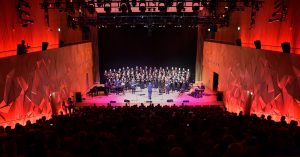
The growth in youth choral participation is largely due to state support. The Ministry of Culture has created performance opportunities and venues for children and youth choirs across the country. Events and competitions have propelled participation, and significant financial investment in music and choral programmes in schools have ensured sustainability. There will soon be mandated choral programmes in every primary school in the country, though Covid-19 has temporarily delayed the launch of this initiative. Another significant government institution is the Qatar Foundation, a state-funded charity devoted to the promotion of education, health, scientific research, and the arts. Among its portfolio of projects are the Qatar Philharmonic Orchestra and the Qatar Music Academy. The Qatar Philharmonic Orchestra is the only professional orchestra in the Gulf region and has brought an influx of professional musicians to the country, many of whom engage directly with music programmes for children and youth. The Qatar Music Academy houses both Western and Arabic music departments and offers quality music training, including choral programmes, to promising young musicians of all nationalities. But not all youth initiatives are state-sponsored. As an example, the Qatar Youth Choir, founded and directed by Alena Pyne, has in six short years grown from a modest ensemble into an impressive national-level choir that regularly graces international and local stages.
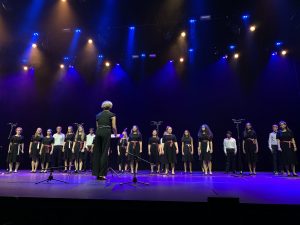
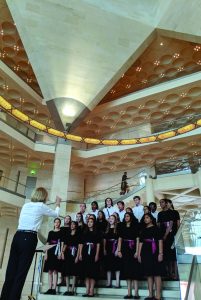
While the state supports growth in youth singing and ensures the next generation of choral enthusiasts, Qatar’s current crop of adult choristers draws heavily from Qatar’s expatriate community, and has evolved with minimal state involvement. Expatriates make up over 90% of Qatar’s population, and as a result, singers from diverse cultural and choral backgrounds find themselves mingling on Qatar’s choral risers. Qatar’s leading choral ensemble, the Qatar Concert Choir, is a prime example of this with singers who hail from thirty-one different countries. No matter the language sung, be it Finnish, Japanese, French or Malayalam, there is always a native speaker in the choir to keep pronunciation honest. Community choirs, audition choirs, small vocal ensembles, choirs catering to congregations or specific linguistic groups: the adult choral scene in Qatar is diverse, eclectic, and growing exponentially.
The award of the 2023 WSCM has simultaneously energized Qatar’s choral community to organize, and stimulated regulatory bodies in Qatar to create the legal framework necessary to register these kinds of cultural associations. Giovanni Pasini has worked closely with authorities to adjust and shape the existing regulations to accommodate these new choral entities.
“You want to make sure you do it right at this stage…or at least as “right” as you are able. No doubt there will be adjustments made as we move forward, but I am confident we are starting with the conditions and tools needed for Qatar’s choral community to flourish.”
The Qatar National Choral Association (QNCA) is the first locally-based non-profit NGO ever registered in the State of Qatar and has cleared the way for others to follow. The QNCA works with Qatar-based choirs, choral directors, choral event organizers, and leaders in the music community, creating links with government and private sector partners. Covid-19 has delayed some of the organization’s spring 2020 projects, but board elections are being scheduled for this fall and there is enthusiasm for the work ahead as Qatar prepares to host the 2023 WSCM.
Another nascent organization that has shown rapid growth and success is Sing Qatar, an association of choirs, choir directors, and singers in Qatar that seeks to develop and support all forms of group singing in Qatar. Launched in October 2019 the committee is chaired by Alena Pyne.
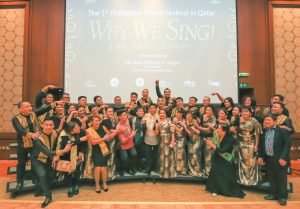
This trend towards “organizing” is not only happening in Qatar! November 2019 saw the birth of the Arab Choral Network, with founding members drawn from Lebanon, Jordan, and Qatar. Thanks to a dedicated team of volunteers, the Arab Choral Network is expanding rapidly across the region with twenty-seven choirs in nine countries already registered and new choirs joining all the time as word spreads. The Arab Choral Network links choirs across the Arab world and has plans for regular festivals, exchanges, and the like. Additionally, there is a strong mandate to promote the composition, arrangement and performance of Arab choral music. The first Arab Choral Festival (sponsored by the Arab Choral Network, Qatar’s Ministry of Culture, and the Qatar National Choral Association) scheduled for March 2020 in Doha was postponed due to the pandemic; however, plans are ready to restart once conditions are safe again.
Covid’s enforced slowdown is a devastating blow to the global choral community. The cancelation and postponement of rehearsals, concerts, festivals, tours and competitions is hard on us all. But, as Qatar’s choral organizers can attest, this quiet time can still be productive. We look forward to witnessing the evolution of this young and vibrant choral community!
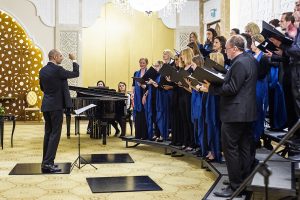
 Jennifer Taynen hails from Canada where she studied voice, piano, and music theory, through the Royal Conservatory of Music. She has been singing in audition choirs since the age of eight and a has amassed a portfolio of choral and solo singing experience that includes regional and national level competitions and spans three continents. Jennifer is the Co-Director of the Qatar National Choral Association, General Manager of the Qatar 2023 WSCM, founding member of the Doha Chamber Choir, and Secretary of the Qatar Concert Choir. She has been a resident of Doha, Qatar since 2013. Email: jennifer@wscm2023.com
Jennifer Taynen hails from Canada where she studied voice, piano, and music theory, through the Royal Conservatory of Music. She has been singing in audition choirs since the age of eight and a has amassed a portfolio of choral and solo singing experience that includes regional and national level competitions and spans three continents. Jennifer is the Co-Director of the Qatar National Choral Association, General Manager of the Qatar 2023 WSCM, founding member of the Doha Chamber Choir, and Secretary of the Qatar Concert Choir. She has been a resident of Doha, Qatar since 2013. Email: jennifer@wscm2023.com